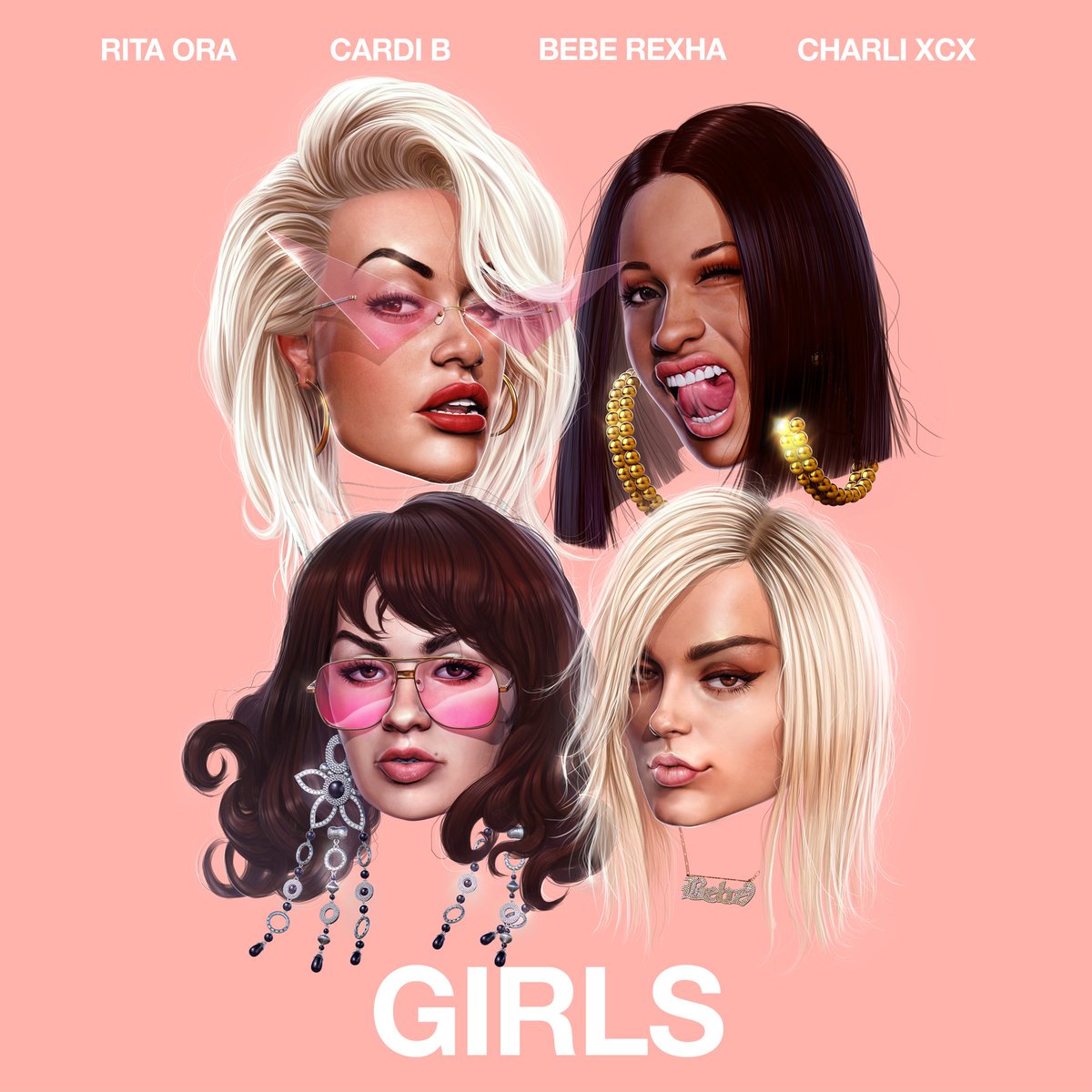When I first heard Girls — the controversial new collaboration from Rita Ora, Charli XCX, Cardi B and Bebe Rexha — I’ll readily admit that my first reaction was not empowerment. Instead, it was a weary shrug of relatability. My first years spent with one foot tentatively out the closet were characterised by vast quantities of red wine; ethanol-flavoured armour to help fuel my first gay experiences on nights out. The male gaze was ever-present, hungry eyes consuming every kiss like it belonged to them. Strangers often grew bolder as the night progressed. Strolling nonchalantly over, asking to join in. You grow numb to this presence over the years, but it’s always there.
When I heard Charli XCX flippantly sing the line “last night, yeah, we got with the dude/I saw him, he was lookin’ at you,” on Girls, it grated. Cardi B’s verse — which includes the lyric “now I could be your lipstick, just for one night” and mentions scissoring (in the middle of the dancefloor?) — rang just as many alarm bells, marketing queerness as a one night drunken phase that takes place between traditionally femme-presenting women. Much of the song seemed like an unneeded regression to the days of I Kissed A Girl; perpetuating the idea that women’s desire for each other is a performance that invites male participation.
These lyrical blips aside — granted, they’re sizeable ones — Girls also seems to be a song that sets out with wholly positive intentions to depict bisexuality in a pop song. Rita Ora’s verse, especially, is a radical declaration in the context of an incredibly heteronormative pop landscape. “I ain’t one-sided, I’m open-minded/I’m 50/50 and I’m never gonna hide it,” she sings.
After the release of Girls, a sorry state of affairs gradually panned out. Lesbian-identifying pop artist Hayley Kiyoko entered the debate. “I don’t need wine to kiss girls,” Kiyoko said on Twitter. “I’ve been loving women my whole life”. Then critics of the song began to dismiss Ora’s experiences entirely, initially writing the whole thing off as a misstep, and the Girls backlash took on an unpleasant tone. The backlash became just as problematic as the song’s clumsy lyrical evocations.
While the intoxicated chorus of Girls might bring back difficult memories of tequila-fuelled first explorations for some listeners, it’s also a valid experience to write about, even if it isn’t necessarily an empowering one. The fallout put Rita Ora in a horrible position, forced to justify her own sexuality in an apology statement. “I have had romantic relationships with women and men throughout my life, and this is my personal journey,” she wrote on Twitter. “I am sorry if how I expressed myself in my song has hurt anyone”.
It’s hugely important to examine rigorous LGBTQ representation in pop music, and pull up on bad lyrics that reinforce the status quo, but it’s equally important to question the very circumstances that allowed a situation like this to escalate in the first place.
The answer can be found with a single peek behind the scenes of Girls — a typical pop industry space which contains a grand total of six male producers and/or songwriters. Hardly empowering, and so it follows logically that certain lyrical moments will land clumsily, when the song is supposedly about queer women’s experiences. We’ve all seen the clip of Justin Timberlake grossly giddy with excitement, watching Britney, Christina and Madonna making out performatively at the 2003 VMAs. We’ve all heard Jessie J and Nicki Minaj denounce their so-called “bisexuality”, citing it as a phase acted out for attention. Rather than hating on these artists for profiting off the experiences of queer women we should also be questioning why they were pressured to do so in the first place.
Recently Harry Styles debuted a song called Medicine when playing live, in which he sang “the boys and girls are here, I mess around a bit, and I’m okay with it.” The song was immediately hailed as a bisexual anthem, with Styles free to identify as he pleased. “I don’t feel like it’s something I’ve ever felt like I have to explain about myself,” he said last year. This should be the status quo for all artists who sing about their experiences.
As well as holding Ora and her collaborators to account, we need to understand that the blame for this whole mess lies as much with the male-dominated pop industry and its exploitative treatment of female sexuality. Songs like Not Myself Tonight by Christina Aguilera and the infamous I Kissed A Girl (both songs were written by a men) help to further encourage the idea that romantic attraction between women is frivolous, substanceless, and up for grabs. It’s this background history of opportunistic objectification that made people instantly suspicious of Girls, which is understandable. So let’s continue to question songs like this, but that doesn’t mean laying all blame on the shoulders of women managing to succeed in the misogynistic world of pop.

